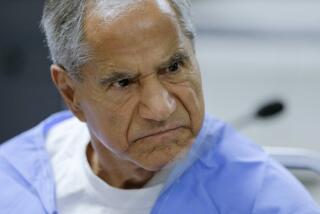More freedom for Hinckley?
- Share via
We wouldn’t presume to say whether John W. Hinckley Jr., who attempted to assassinate President Ronald Reagan in 1981, should be allowed to spend more time outside the mental hospital where he has been confined for much of the last three decades. Hinckley has not committed any acts of violence on his furloughs from St. Elizabeths Hospital in Washington. On the other hand, according to a detailed report in the Washington Post, he has engaged in questionable behavior.
But on one question we do have an opinion: Hinckley should be treated by a federal judge the same way any other patient in his position would be.
Under the hospital’s proposals, Hinckley would be able to visit his mother in Williamsburg, Va., twice for 17 days and six times for 24 days each year. More important, hospital officials would have the authority to place him on “convalescent leave” without court approval. Those provisions would be a significant liberalization of the current terms of Hinckley’s release, which allow him 10-day visits 12 times a year.
The attempted assassination of Reagan was a heinous act. And the president wasn’t the only one injured. Hinckley shot three others, including White House Press Secretary James Brady, whose brain injuries persist to this day. But Hinckley was found not guilty by reason of insanity. Under the law, the relevant question is not whether he has been punished enough — or punished at all — but whether he is mentally able to live for longer periods outside confinement without causing danger to himself or others. His doctors maintain that he is.
Federal prosecutors disagree. They worry that under the plan proposed by the hospital, the Secret Service wouldn’t be allowed to keep track of Hinckley’s movements on six “unaccompanied outings.” The service has monitored Hinckley’s comings and goings in the past and has provided evidence of his activities while on furlough, including, allegedly, looking in a bookshop at books about Reagan and presidential assassinations.
It’s up to U.S. District Judge Paul Friedman to decide whether these and other examples of Hinckley’s behavior raise concerns about a more generous release policy. Friedman, who has gradually expanded Hinckley’s privileges over the years, could approve a plan that would make the would-be assassin virtually a free man. In making that decision, he should be guided by the law and the facts and the principle that all patients should be treated the same, not by the protest that would greet a decision favorable to Hinckley.
More to Read
A cure for the common opinion
Get thought-provoking perspectives with our weekly newsletter.
You may occasionally receive promotional content from the Los Angeles Times.









